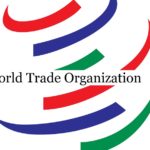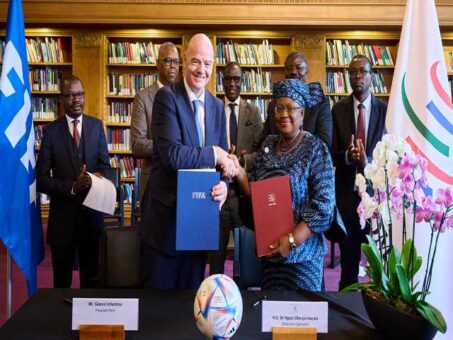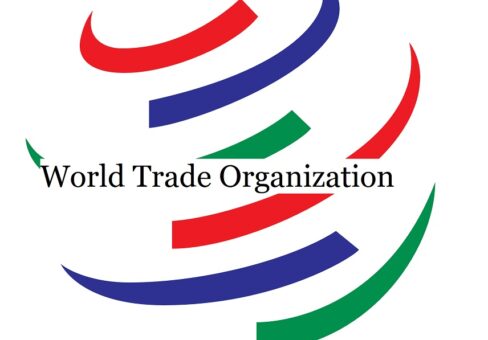Beijing, February 6, 2025 – China has officially approached the World Trade Organization (WTO) to challenge the latest tariff measures imposed by the United States on goods originating from China.
(more…)Tag: World Trade Organization
-

WTO Warns Geopolitical Tensions Pose Risks to Trade Rebound
The World Trade Organization (WTO) released a report today with a cautiously optimistic outlook on global trade. While a rebound is expected this year following a 2023 contraction, the WTO warns that geopolitical tensions and policy uncertainty could hinder progress.
(more…) -

UAE Contributes $10 Million to Support WTO Initiatives
The United Arab Emirates (UAE) has reaffirmed its dedication to fostering sustainable and inclusive global trade by contributing $10 million to three essential World Trade Organization (WTO) trust funds.
(more…) -

US accepts agreement on fisheries subsidies: WTO
On April 11, the United States deposited its instrument of acceptance for the Agreement on Fisheries Subsidies, becoming the fourth member of the World Trade Organization (WTO) to do so.
(more…) -

Global trade restrictions rising amid economic uncertainty, Ukraine War: WTO
A report released by World Trade Organization (WTO) on Tuesday showed that trade restrictions are increasing in a context of economic uncertainty exacerbated by the COVID-19 pandemic, the war in Ukraine and the food security crisis.
According to the latest WTO Trade Monitoring Report presented at a meeting of the Trade Policy Review Body, WTO members are introducing restrictions at an increased pace, particularly on food, feed and fertilizers. The stockpile of import restrictions in force also continues to grow.
WTO Director-General Ngozi Okonjo-Iweala called on WTO members to refrain from adopting new trade-restrictive measures, particularly export restrictions, that can further contribute to a worsening of the global economic outlook and urged them to cooperate to keep markets open and predictable in order to allow goods to move around the world to where they are needed.
“Members have increasingly implemented new trade restrictions, in particular on the export side, first in the context of the pandemic and more recently in the context of the war in Ukraine and the food security crisis. Although some of these export restrictions have been lifted, many others persist,” she said.
“Out of the 78 export restrictive measures on food, feed, and fertilizers introduced since the start of the war in late February, 57 are still in place, covering roughly USD 56.6 billion of trade. These numbers have increased since mid-October, which should be a cause for concern.”
“As I told G20 Leaders at their summit in Indonesia a few weeks ago, lifting those export restrictions is fundamental to reduce price spikes and volatility and to allow goods to flow to where they are urgently needed,” she added.
During the review period for the report, from mid-October 2021 to mid-October 2022, WTO members introduced more trade-facilitating (376) than trade-restrictive (214) measures on goods (unrelated to the pandemic), with the average number of trade-facilitating measures per month at its highest since 2012.
Most of the facilitation happened on the import side while most of the restrictions were on the export side. For the first time since the beginning of the monitoring exercise in 2009, the number of export restrictions outpaced that of import restrictions.
The trade coverage of the trade-facilitating measures was estimated at USD 1,160.5 billion, and that of the trade-restrictive measures at USD 278.0 billion. The stockpile of import restrictions in force also continued to grow. By mid-October 2022, over 9 per cent of global imports continue to be affected by import restrictions implemented since 2009 and which are still in force.
Initiations of trade remedy investigations declined sharply during the review period (10.9 initiations per month, the lowest since 2012) after reaching its highest peak in 2020 (36.1 initiations per month).
These actions remain an important trade policy tool for many members, accounting for 37.4 per cent of all non-COVID-19-related trade measures on goods recorded. Anti-dumping continues to be the most frequent trade remedy action in terms of initiations and terminations.
The implementation of new COVID-19-related trade measures decelerated over the past 12 months, with 45 such measures recorded on goods and four on services. Additional information communicated by WTO members mainly consisted of termination of existing measures or amendments of others.
The number of new COVID-19-related support measures by WTO members and observers to mitigate the social and economic impacts of the pandemic fell sharply over the review period.
Since the outbreak of the pandemic, 443 COVID-19-related trade and trade-related measures in the area of goods have been introduced. Most were trade-facilitating (246 or 56 per cent), while the rest were trade-restrictive (197 or 44 per cent). During the review period, members continued to phase out the pandemic-related measurers, and in particular the restrictive ones.
According to information received by the WTO Secretariat, as of mid-October 2022, 79.2 per cent of the COVID-19-related trade restrictions have been repealed, leaving 27 export restrictions and 14 import restrictions in place. Although the number of the pandemic-related trade restrictions still in place has decreased, their trade coverage remains important at USD 134.6 billion.
Since the outbreak of the pandemic, a consistent feature of the trade and trade-related measures taken in response to the COVID-19 crisis has been the frequent changes, adjustments and gradual roll-back of such measures to reflect the evolving situation.
The updated lists of measures implemented in the context of the current pandemic are available on the COVID-19 page of the WTO website and cover the areas of goods, services and intellectual property as well as measures communicated by members on general economic support.
-

WTO, FIFA sign MoU for economic, social development
The World Trade Organization (WTO) and the International Federation of Association Football (FIFA) agreed to collaborate by exchanging views of their respective activities and preparing common strategies and projects in areas of shared interest.
Regarding the WTO’s cotton programme, the WTO and FIFA will explore opportunities to enhance the participation of the “Cotton Four” (C4) countries (Burkina Faso, Benin, Chad and Mali) and other LDC cotton producers in global football apparel value chains.
The two organizations will also work together in the development of publications, including a joint study on the economic impact of football and its role in unlocking global economic growth potential, and will explore options for the development of capacity-building activities that support the use of football as a tool for women’s empowerment, particularly in LDCs.
READ MORE: WTO tariff heading proposed for sales tax on services
Ngozi Okonjo-Iweala, WTO Director-General, said: “I’m really excited at the prospect of collaborating with FIFA to try to leverage the cotton sector in a positive way for poor developing countries such as the Cotton 4. I’m really excited that collaboration with FIFA could help us pull these countries more into the global cotton value chain. I’m also thrilled at the prospect of working on gender empowerment. We have a big sports economy, and to the extent that we can pull this through trade to support women, this is a positive signal.”
FIFA President Gianni Infantino said: “FIFA redistributes its revenue among our 211 member associations to help them develop football in their countries by notably investing in infrastructure, facilities, competitions, refereeing and coaching. Yet, we believe that there is still more that football can do, especially for the youth in the developing world. This important partnership can help us find ways of ensuring that football can further promote sustainable development for everyone to benefit from the global football economy.”
On behalf of the C4 countries, as well as Côte d’Ivoire and all the African countries and LDCs that produce and export cotton, Ambassador Ahmad Makaila of the Republic of Chad welcomed this “excellent initiative” undertaken in the framework of the collaboration between FIFA and the WTO.
“For the C4, signature of the Agreement between the WTO and FIFA strengthens a common vision, an inclusive and lasting partnership and a choice to favour cooperation and negotiation at the WTO in the search for the most appropriate solutions to the cotton issue,” he stated. “This robust cooperation is more than ever indispensable to ensure that our countries bounce back from the many crises we are currently facing, undertake better reconstruction and help achieve the Sustainable Development Goals.”
Under the Memorandum of Understanding (MoU), which will remain in force until 31 December 2027, the WTO and FIFA will exchange information and expertise on the economic dimension of football, through participation in conferences, regular meetings and contribution to studies. Once a year, a joint review will be undertaken to assess the collaboration and identify specific activities or projects to be implemented the following year. These activities and projects will be reflected in a Collaboration Plan.
-

Global trade may fall up to 32 percent on COVID-19 disruption: WTO
KARACHI: World trade is expected to fall by between 13 percent and 32 percent in 2020 as the COVID 19 pandemic disrupts normal economic activity and life around the world, said a statement issued by World Trade Organization (WTO) on Wednesday.
The wide range of possibilities for the predicted decline is explained by the unprecedented nature of this health crisis and the uncertainty around its precise economic impact.
But WTO economists believe the decline will likely exceed the trade slump brought on by the global financial crisis of 2008‑2009.
Estimates of the expected recovery in 2021 are equally uncertain, with outcomes depending largely on the duration of the outbreak and the effectiveness of the policy responses.
“This crisis is first and foremost a health crisis which has forced governments to take unprecedented measures to protect people’s lives,” WTO Director-General Roberto Azevêdo said.
“The unavoidable declines in trade and output will have painful consequences for households and businesses, on top of the human suffering caused by the disease itself.”
“The immediate goal is to bring the pandemic under control and mitigate the economic damage to people, companies and countries. But policymakers must start planning for the aftermath of the pandemic,” he said.
“These numbers are ugly – there is no getting around that. But a rapid, vigorous rebound is possible. Decisions taken now will determine the future shape of the recovery and global growth prospects. We need to lay the foundations for a strong, sustained and socially inclusive recovery. Trade will be an important ingredient here, along with fiscal and monetary policy. Keeping markets open and predictable, as well as fostering a more generally favourable business environment, will be critical to spur the renewed investment we will need. And if countries work together, we will see a much faster recovery than if each country acts alone.”
Trade was already slowing in 2019 before the virus struck, weighed down by trade tensions and slowing economic growth. World merchandise trade registered a slight decline for the year of ‑0.1 percent in volume terms after rising by 2.9 percent in the previous year. Meanwhile, the dollar value of world merchandise exports in 2019 fell by 3 percent to US$ 18.89 trillion.
In contrast, world commercial services trade increased in 2019, with exports in dollar terms rising by 2 percent to US$ 6.03 trillion. The pace of expansion was slower than in 2018, when services trade increased by 9 percent.
-

World services trade to further weaken on coronavirus impact: WTO
KARACHI: World Trade Organization (WTO) has said ongoing weakness in world service trade likely to worsen due to economic impact of the COVID-19 virus.
“World services trade growth continued to weaken toward the end of 2019 and into the first quarter of 2020,” according to the WTO’s Services Trade Barometer, released on 11 March 2020.
The latest reading of 96.8 is down from the 98.4 recorded last September and well below the baseline value of 100 for the index, suggesting below-trend growth in world services trade.
“The indicator does not yet fully capture the economic impact of the COVID-19 virus and is likely to decline further in the coming months.”
Among the component indices, the largest declines were in passenger air travel (93.5) and container shipping (94.3), growth of which was already moderating before the coronavirus COVID-19 outbreak.
Both indices cover developments through January and may partly reflect early efforts to halt the spread of the disease, which intensified toward the end of the month.
The drop in the container shipping index was driven by lower shipping volumes in Asia while the slowdown in passenger air travel was more broad-based, also covering North America, South America and Europe.
The global financial transactions (97.7) and ICT services (97.0) indices also dipped below trend, while the construction index (99.8) appears to have held steady.
The global services Purchasing Managers’ Index (96.1) is the most forward-looking barometer component, reflecting expectations that COVID-19 is likely to continue to weigh on services trade in the near-term.
An approximate measure of the volume of world services trade shows that year-on-year growth in services trade activity already fell from 4.7 percent in the first quarter of 2019 to 2.8 percent in the third quarter.
The Services Trade Barometer highlights turning points and changing patterns in world services trade. Unlike its counterpart for goods, the fluctuations registered by the services indicator coincide with movements in actual trade flows, rather than anticipating them.
Readings of 100 indicate growth in line with medium-term trends. Readings greater than 100 suggest above-trend growth while those below 100 indicate the opposite.
-

Trade restrictions increase to historic high levels: WTO
KARACHI: The World Trade Organization (WTO) has observed that trade restrictions have increased to historic high levels. The Director-General’s annual overview of trade-related developments discussed on 12 December at a meeting of the Trade Policy Review Body shows that trade restrictions by WTO members continue at historically high levels.
(more…)